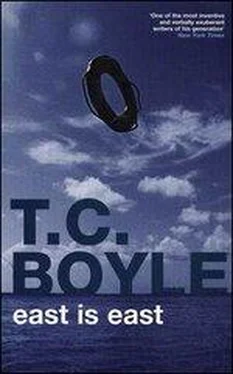Tom Boyle - East is East
Здесь есть возможность читать онлайн «Tom Boyle - East is East» весь текст электронной книги совершенно бесплатно (целиком полную версию без сокращений). В некоторых случаях можно слушать аудио, скачать через торрент в формате fb2 и присутствует краткое содержание. Жанр: Современная проза, на английском языке. Описание произведения, (предисловие) а так же отзывы посетителей доступны на портале библиотеки ЛибКат.
- Название:East is East
- Автор:
- Жанр:
- Год:неизвестен
- ISBN:нет данных
- Рейтинг книги:5 / 5. Голосов: 1
-
Избранное:Добавить в избранное
- Отзывы:
-
Ваша оценка:
- 100
- 1
- 2
- 3
- 4
- 5
East is East: краткое содержание, описание и аннотация
Предлагаем к чтению аннотацию, описание, краткое содержание или предисловие (зависит от того, что написал сам автор книги «East is East»). Если вы не нашли необходимую информацию о книге — напишите в комментариях, мы постараемся отыскать её.
, praised by
in
as "one of the most exciting young fiction writers in America," the result is a sexy, hilarious tragicomedy of thwarted expectations and mistaken identity, love, jealousy, and betrayal.
East is East — читать онлайн бесплатно полную книгу (весь текст) целиком
Ниже представлен текст книги, разбитый по страницам. Система сохранения места последней прочитанной страницы, позволяет с удобством читать онлайн бесплатно книгу «East is East», без необходимости каждый раз заново искать на чём Вы остановились. Поставьте закладку, и сможете в любой момент перейти на страницу, на которой закончили чтение.
Интервал:
Закладка:
She turned it over and there they were, the bold red ideographs that spelled out the name of the Tokachi-maru. She couldn’t read them, of course, but they were a revelation nonetheless. Saxby hovered over her, peering down at the thing as if it were treasure. The light was in her lap, the breeze gave her a scent of the shore. “Yes,” she said finally, “Chinese.”
The Tokachi-maru
Hiro tanaka was no more chinese than she was. he was a Japanese, of the Yamato race—or at least on his mother’s side he was, no one would question that—and he’d left the Tokachi-maru amid strained circumstances. The fact is, he jumped ship. Literally. This wasn’t a case of cozying up to a barmaid or falling down dead drunk in some back alley while the ship weighed anchor; this was deliberate, death-defying, a leap into the infinite. Like his idol Yukio Mishima, and Mishima’s idol before him, Jōchō Yamamoto, Hiro Tanaka was a man of decision. When be jumped ship, he didn’t entangle himself in verbal niceties: no, he just jumped.
On the day in question, the Tokachi-maru was steaming north along the coast of Georgia, bound for Savannah with a load of tractor parts, DAT recorders and microwave ovens. It was a day like any other, the wind brisk, the sun baked into the sky, the 12,000-ton freighter ironing the waves as if they were wrinkles in a shirt. All but six of the forty-member crew sat straight-backed over their western-style lunches (corned beef hash, sardines in oil, scrambled eggs and home fries, all wedded in a single pot and seasoned with A. 1. sauce and Gulden’s mustard). Captain Nishizawa was in his cabin, sleeping off his preprandial sake; Chief Mate Wakabayashi and Able Bodied Seaman Kuma were in the chart room and at the helm, respectively; Ordinaries Uetto and Dorai were on watch; and Hiro was in the brig.
Actually, Hiro was in a storage closet on the third deck. It was sixty-four feet square, or about the size of the apartment he had occupied with his grandmother prior to signing on the Tokachi-maru, and it was illuminated by a single jittery 40-watt bulb. Hiro had been given a wooden bowl and a pair of chopsticks for his alimentary needs, a bucket in which to relieve himself and a futon to spread on the cold steel floor. There was no ventilation, and the little room stank of fumigant and the Bunker C fuel the huge steam turbines burned day and night. Twenty mops, twenty buckets and sixteen flat-headed brooms hung from hooks screwed into the walls. A scatter of odds and ends—paint scrapers, empty Sapporo boxes, a single Nike tennis shoe spattered with tar—lay where the last storm had strewn them. The door locked from the outside.
Though he was conscientious, well mannered and inoffensive, and so silent and circumspect as to be nearly invisible among his shipmates, Hiro found himself confined to this hateful steel room, his diet limited to two balls of white rice and one tin cup of water daily, because of an uncharacteristic act of defiance: he had disobeyed the direct order of an officer. The officer was Chief Mate Wakabayashi, a survivor of the Battle of Rarotonga who carried shrapnel in his lower back, legs, arms, feet and at the base of his skull, and whose temper consequently tended to be short. He had issued a direct order to Hiro to cease and desist constricting the windpipe of First Cook Hideo Chiba, who at the time lay thrashing on the galley floor beneath Hiro’s full and outraged weight. And that was a good deal of weight: at five foot ten, Hiro, who was inordinately fond of eating, weighed close to two hundred pounds. Chiba, who was inordinately fond of drinking, weighed less than a wet mop.
The moment was chaotic. Second Cook Moronobu Unagi, who had once parboiled the face of an OS in a dispute over a bottle of Suntory, was screeching like a parrot: “He’s killing him! Murder, murder, murder!”; the Chief Engineer, an intense silent man in his seventies, with bad feet and ill-fitting dentures, tugged ineffectively at Hiro’s shoulders; and half a dozen deckhands stood around jeering. Chief Mate Wakabayashi, in his pristine white uniform, scurried up to where the combatants lay entangled on the galley floor, delivered his stentorian order, and was immediately flung into a pot of clear broth as the ship chose that moment to plunge into a trough. Soup—it was a twenty-gallon pot—cascaded onto the floor, searing Hiro’s back and permeating Chiba, who already stank enough for three men, with the essence of reduced fish. Through it all, Hiro held his grip.
And what had driven so mild a man to so desperate a pass?
The immediate cause was a pan of hard-cooked eggs. Hiro, who’d signed on the Tokachi-maru as Third Cook, beneath the drunken and foul-smelling Chiba and the drunken, leering and unctuous Unagi, was preparing a dish of nishiki tamago as an appetizer for the evening meal. The task consisted of shelling a hundred hard-boiled eggs, carefully separating the yolks from the whites, very finely chopping and seasoning each, and finally reuniting them—tenderly—in half-inch layers in a succession of stainless-steel pans. Hiro had learned the recipe from his grandmother—and he knew some thirty others by heart—and yet this was the first time in the six weeks since the ship had left Yokohama that he’d been allowed to prepare the dish himself. More usually, he acted as sous chef, errand boy and galley slave, scrubbing pans, polishing the gas ranges, cleaning mountains of defrosted squid, cuttlefish and bonito, chopping seaweed and peeling grapes till his fingers went numb. On this particular afternoon, however, Chiba and Unagi were indisposed. They had been drinking sake since breakfast in celebration of O-bon, the Buddhist festival of ancestral spirits, and Hiro had been left to himself while they strove to commune with the shades of the departed. He worked hard. Worked with pride and concentration. Eight trays lay before him, exquisitely prepared. As a finishing touch, he sprinkled the dishes with black sesame seed, just as his grandmother had taught him.
It was a mistake. Because at that moment, just as he held the shaker inverted over the last tray, Chiba and Unagi staggered into the galley. “Idiot!” Chiba screeched, slapping the shaker from his hand. The shaker clattered off the gas range. Hiro averted his face and hung his head. Through his sandals, deep in the soles of his feet, he could feel the ta-dum, ta-dum, ta-dum of the screws churning through the sour green waves beneath them. “Never,” Chiba seethed, his sunken chest and fleshless arms trembling, “never use black sesame on nishiki tamago.” He turned to Unagi. “Did you ever hear of such a thing?”
Unagi’s eyes were slits. He rubbed his hands together as if in anticipation of some rare treat, and he bowed his head with a quick snap. “Never,” he breathed, waiting, waiting, “except maybe among foreigners. Among gaijin.”
Now Hiro looked up. The underlying cause of his explosion, the cause of all his torment in life, was about to surface.
Chiba leaned into him, his monkey face twisted with hatred, flecks of spittle on his upper lip. “Gaijin” he spat. “Long-nose. Ketō. Bata-kusai.” And then he unfolded his clenched fist, studied the palm of his hand for an instant, and without warning struck a savage blow to the bridge of Hiro’s nose. Then he turned to the pans of nishiki tamago. Raging, in a mad flurry of skinny wrists and snapping elbows, he overturned them on the floor, one after another. “Offal!” he shouted. “Dog shit! Fit for pigs!” Through it all, Unagi regarded Hiro through half-closed eyes, grinning.
This is the point at which Hiro lost control. Or rather, he didn’t lose control exactly, but attacked his tormentor in what Mishima would call “an explosion of pure action.” The nishiki tamago was on the floor, the twenty-gallon kettle rattling its lid, Unagi grinning and Chiba spouting invective, the moment suspended as the tintinnabulation of the last pan hung in the air, and then the First Cook was swimming in chopped egg and Hiro’s fingers were locked on his throat. Chiba gasped, the turkey flesh of his neck turning red under Hiro’s white, white fingers. Unagi screamed: “Murder! Murder! Murder!” And all the while Hiro hung on, ignoring the jeers, the scalding soup, Chiba’s hot foul breath and the face that swelled beneath him like a blood blister, oblivious to Wakabayashi and the Chief Engineer, fighting like a rabid dog against the pull of the eight men it took to separate him from his tormentor. He was beyond caring, beyond pain, the words of Jōchō pounding in his head: One cannot accomplish feats of greatness in a normal frame of mind. One must turn fanatic and develop a mania for dying.
Читать дальшеИнтервал:
Закладка:
Похожие книги на «East is East»
Представляем Вашему вниманию похожие книги на «East is East» списком для выбора. Мы отобрали схожую по названию и смыслу литературу в надежде предоставить читателям больше вариантов отыскать новые, интересные, ещё непрочитанные произведения.
Обсуждение, отзывы о книге «East is East» и просто собственные мнения читателей. Оставьте ваши комментарии, напишите, что Вы думаете о произведении, его смысле или главных героях. Укажите что конкретно понравилось, а что нет, и почему Вы так считаете.











